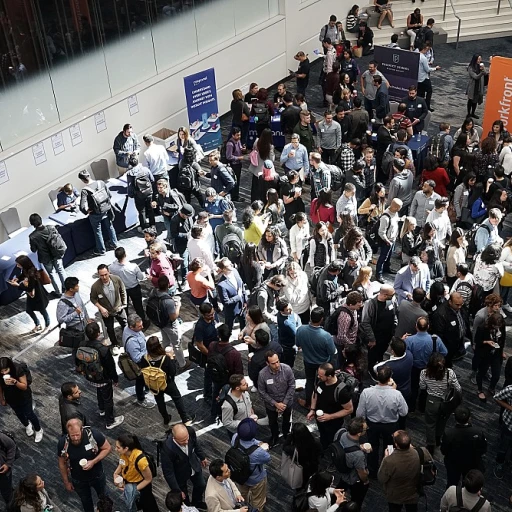
Understanding the Evolving Role of HR
The Dynamic Shift in HR Responsibilities
In recent years, the role of Human Resources (HR) has undergone a significant transformation. No longer confined to administrative tasks, HR professionals are now pivotal in shaping the strategic direction of organizations. This evolution is particularly evident in talent acquisition, where HR's role has expanded to include strategic planning and employee engagement.
HR teams are now tasked with more than just filling vacancies. They are responsible for ensuring that the right talent is not only attracted but also retained and developed. This shift requires a deep understanding of the company's culture and the ability to align recruitment strategies with organizational goals. The focus is on creating a workplace that celebrates diversity and inclusion, fostering an environment where employees feel valued and engaged.
Embracing Technology and Innovation
As the workplace continues to evolve, HR professionals are leveraging technology to enhance their talent acquisition strategies. From AI-driven recruitment tools to data analytics, these innovations are helping HR teams streamline processes and make more informed decisions. This technological shift is crucial in a competitive job market, where attracting top talent requires a proactive and innovative approach.
Moreover, HR's role in professional development and employee appreciation has become more pronounced. By organizing events such as professional days and celebrating key dates, HR can boost employee morale and engagement. These initiatives not only recognize hard work but also contribute to a positive company culture.
In conclusion, the evolving role of HR in talent acquisition is a testament to the profession's adaptability and strategic importance. As we look to the future, HR will continue to play a crucial role in shaping the workforce, addressing challenges, and driving organizational success.
Innovative Talent Acquisition Strategies
Exploring Innovative Techniques in Talent Acquisition
The role of innovative talent acquisition strategies has become increasingly critical in the dynamic landscape of human resources. Employers today are tasked with attracting the right talent while ensuring a streamlined and engaging recruitment process that aligns with company goals and values. Understanding new strategies ensures that our teams remain competitive. A key aspect of this approach is leveraging technology to streamline the talent hunt. From AI-driven applicant tracking systems to virtual interviewing platforms, technology reduces the hiring timeline and improves the candidate experience, ultimately leading to higher employee engagement and satisfaction. Incorporating proactive sourcing methods can also enhance talent acquisition efforts. Using platforms like LinkedIn and industry-specific forums, employers can connect with talented professionals before they even apply. This approach not only saves time but also allows organizations to celebrate the diversity of skills and perspectives across their teams. Offering potential candidates a glimpse of the workplace culture can be a game-changer. Initiatives such as virtual tours and employee testimonials help showcase the team environment, highlighting why your company is a great place to work. According to the Society for Human Resource Management, candidates are more likely to join companies where they feel they align with the workplace culture, potentially increasing retention rates. Additionally, focusing on professional development opportunities within recruitment strategies can serve as a compelling pull factor. Candidates are drawn to companies that value their growth and offer clear paths for development. This might include highlighting opportunities for skill development, educational programs, and even celebrating achievements on professional days. Embracing flexible work arrangements is another innovative measure. Offering remote work options or compressed workweeks can appeal to a broader pool of candidates, ensuring your organization meets varied employee needs and preferences. Putting these innovative strategies into practice not only showcases your company as a forward-thinking employer but also supports long-term human resource development. For more about how companies are implementing innovative talent acquisition and creating inclusive environments, explore Navigating Employment Opportunities in Paris, Texas.Addressing Diversity and Inclusion
Promoting an Inclusive and Diverse Workforce
In the evolving landscape of talent acquisition, organizations are placing an increased focus on diversity and inclusion within the workplace. This inclusive approach recognizes the value that diverse backgrounds, perspectives, and skills bring to a team. It is essential to celebrate and appreciate this diversity, not only during national observances or key dates but throughout the year.
Diversity and inclusion play a critical role in enhancing employee engagement and satisfaction. Recognizing the hard work and contributions of employees from various backgrounds fosters a more cohesive and motivated team. Recent studies have shown that organizations that prioritize diversity are more likely to attract and retain top talent, resulting in improved creativity and innovation.
It's important for human resources professionals to develop and implement inclusive talent acquisition strategies. These should go beyond compliance, focusing on creating an environment where all employees feel valued and appreciated. By promoting cultural appreciation and mental health awareness, companies not only strengthen their employer brand but also contribute to the professional development of their workforce.
Developing engagement ideas that celebrate diversity, such as inclusive holidays or international day events, can enrich the company culture. Additionally, recognizing professional achievements and creating opportunities for growth are crucial for sustaining a positive workplace. Incorporating professional day celebrations, such as Human Resource Professional Day or other relevant days throughout the year, can enhance team engagement.
Ultimately, fostering an inclusive environment is about bringing everyone to the table and taking into account their unique perspectives. To learn more about innovative talent acquisition strategies and how to effectively navigate these complexities, visit navigating the future of staffing strategies for success. This approach not only enhances organizational effectiveness but also supports long-term business development goals.
Overcoming Challenges in Talent Acquisition
Overcoming Barriers to Effective Talent Acquisition
In any organization, talent acquisition professionals face numerous challenges that require strategic planning and innovative solutions. Addressing these barriers effectively is crucial for assembling a prosperous and dynamic team. Here, we will explore some common obstacles encountered in the hiring process and suggest ways to overcome them.
- Time Constraints: One of the most significant hurdles faced by HR teams comes from the pressure to fill positions swiftly while ensuring the quality of hire. Aligning hiring timelines with organizational needs, especially during peak periods such as the national tax return months, can be demanding. Implementing an efficient process with clear timelines can help alleviate these pressures.
- Compliance and Legal Challenges: Navigating the legal landscape of employment can be intricate. Organizations must ensure their practices align with the employment laws to avoid legal pitfalls. Staying informed on key dates and regulations, especially around day labor laws, is essential to maintain compliance and protect the company from potential legal issues.
- Employee Engagement: Once the right talent is acquired, ensuring they are engaged is another challenge. Offering opportunities for professional development and implementing thoughtful employee engagement ideas can foster a more enthusiastic workspace and enhance retention rates. Recognizing and celebrating professionals on dedicated days such as professional day or day July can also boost morale and appreciation.
- Diversity and Inclusion: Cultivating a diverse and inclusive workplace helps in attracting a broader range of talent. Implementing strategies that emphasize diversity in hiring not only enriches the team but also enhances the organizational culture and reflects positively on the company’s branding.
- Employer Branding: Maintaining a strong employer brand is pivotal in attracting top talent. A clear, consistent message about company values and culture should be communicated to demonstrate what prospective employees can look forward to as they join the organization. Initiatives related to mental health awareness on day April or other dedicated times can also reinforce a caring workplace culture.
It’s important for HR professionals to stay adaptable and continuously evaluate these strategies to effectively address the challenges in talent acquisition. With the necessary adjustments, an organization can build a solid framework for bringing exceptional professionals on board and keeping the company competitive in the ever-evolving marketplace.
The Impact of Employer Branding
Unveiling the Power of Employer Branding in Talent Acquisition
In the world of talent acquisition, employer branding has emerged as a pivotal factor in attracting and retaining top talent. This goes beyond merely showcasing job opportunities—it's about presenting the organization as a desirable place to work for potential employees. An effective employer brand resonates with the company's core values and mission, influencing how professionals perceive the workplace. Employer branding impacts several areas:- Employer-Employee Alignment: By clearly communicating the organization's values and culture, companies can attract employees whose personal values align with the company's ethos, leading to better engagement and retention over time.
- Reputation Management: A strong employer brand helps in building a positive reputation in the market. This attracts prospective employees who are already interested in being part of a reputable organization, thus simplifying the recruitment process.
- Employee Advocacy and Appreciation: Encouraging employee advocacy is vital. When employees celebrate their experiences and express appreciation for their roles, it enhances the company's image as an exceptional workplace. Utilizing special days like professionals day or employee engagement events can boost morale and foster a positive reputation.
- Recruitment Efficiency: A well-crafted employer brand can significantly reduce the time and resources spent on recruitment. Candidates who are aware of a company's positive culture are often more eager to pursue opportunities within such organizations.
- Engagement and Integration: Integrating brand messaging into day-to-day activities and employee professional development initiatives can bolster engagement. Activities related to mental health awareness or participation in national and international days celebrating human resources can foster a sense of belonging and appreciation.
Future Trends in Talent Acquisition
Emerging Shifts Shaping Talent Acquisition
The landscape of talent acquisition is rapidly evolving, influenced by several emerging trends that reshaping both strategy and expectations. As organizations merge traditional practices with modern innovations, the role of human resources in steering these changes is more crucial than ever.
Data-Driven Recruitment: One of the most transformative trends is leveraging data to make informed hiring decisions. Professionals in HR are increasingly utilizing analytics to predict successful employee engagement and retention. This not only facilitates compliance with strategic company goals but aligns the recruitment process with broader organizational development.
Remote and Hybrid Work Models: The global shift, amplified by recent events, towards remote and hybrid work environments have necessitated an evaluation of existing talent acquisition strategies. Today, HR teams must account for work flexibility preferences, which have become a staple for many employees. This consideration can enhance employee satisfaction and engagement, making positions more attractive to potential candidates.
Focus on Employee Well-being: With increased awareness about mental health, companies are prioritizing wellness initiatives. National and international days, such as key dates in the calendar, including professional days, are opportune moments to celebrate employee achievements, thus fostering appreciation and commitment. Incorporating well-being into talent acquisition strategies not only aligns with company culture but reinforces a supportive professional environment.
Employer Branding: The influence of a strong employer brand cannot be understated. It's a concept pursued with vigor as it plays a crucial role in attracting top-tier talent. Engagement ideas rooted in authentic stories and the celebration of employee milestones, as seen during annual events or specific dates like day February or day August, are essential in building a compelling image of the organization.
As companies look towards the future, embracing these changes and turning them into strategic advantages will be paramount. HR professionals are at the forefront, guiding their organizations through this dynamic period with adeptness and insight. It is essential for companies to continually evaluate their strategies and adapt to the shifting landscape in order to stay competitive and appealing to prospective employees.













